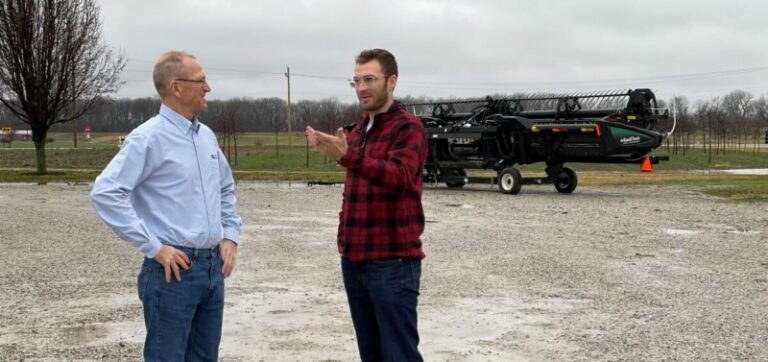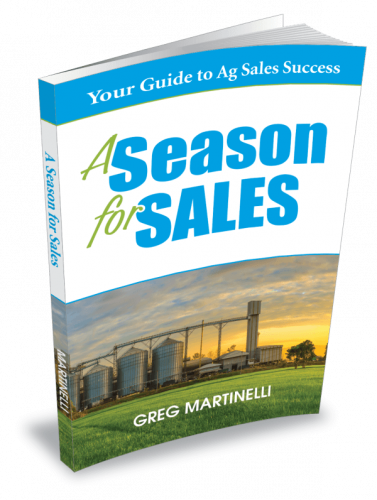4 critical components when struggling in sales
After riding with and coaching hundreds of salespeople over the past 30 years and watching my own behavior, I try to come up with great ways for busy salespeople to improve their selling skills. After running into the same scenario time after time, I try to bring those lessons to you. This one happens too often and it hit me that the solution lies in the acronym NOPQ.
Recently, I was hired to do several ride-along coaching sessions with Kevin. His manager was concerned that Kevin knew what he was doing as an agronomist, but struggled in his results. Customers liked Kevin but there was just something missing. He had a full book of customers and certainly worked hard. The struggle was that Kevin did so much service work for his current customers that he had no time to prospect for new ones. Yet his territory was not growing as his current customers had maxed out on their purchases.
On the first day, Kevin took me to all his best customers. Those that bought almost 100% of their products from him. He was their full-time agronomist. He knew more about their fields than some of them did. At the end of the day, I said, “Ok Kevin, thanks for the milk run. Tomorrow, let’s go to the tough customers and your top prospects.”
If you’re not familiar with the milk run, it’s when a salesperson takes you to all their favorite customers who love them. It’s nice, but as a sales trainer and coach, I learn very little about a salesperson in these scenarios. I want to see them in action when they deal with rejection, when they have to dig in and ask high-value questions to position a solution for a customer.
At the end of the second day, it hit me out of nowhere. Kevin had four of the most common problems that salespeople have. Looking at the list of four, it morphed into the acronym NOPQ. Hopefully, this will help you as you get out there in front of your customers, prospects, and when planning your sales call.
N-O-P-Q
N = NOTES: Kevin was terrible at taking notes. On our second day, we were on seven different farms. Remember, these were either prospects or current customers that didn’t buy all their products from Kevin. So, we were trying to learn what they needed and then get back to them on how he could help them. No notes. I don’t mean a few.
He took zero notes the whole day. We were in some deep discussions that day. Prospects were telling us critical information, but Kevin never wrote anything down. At first, it alarmed me. After the third farm, we stopped for lunch and I couldn’t take it anymore. “Kevin, how do you remember all the info we have gathered this morning? The reason I ask is that I’m noticing you don’t take a lot of notes.” He laughed and commented that he has a pretty good memory. I laughed and mentioned that this would change as he got older and busier. Dropping the ball is one of the most common errors that salespeople make. Failing to follow up on an opportunity is too common. And we use the excuse of being too busy. However, just a few notes organized in some way would have saved Kevin from keeping it all logged in his perfect memory. Besides, it also shows your customer that you care enough to write down their words. It shows respect.
O = Outcomes: Customers don’t need your products. They need what your products do for them. Nobody needs a drill or a shovel. They need a hole.
As salespeople, we are either trained or just naturally think it’s our role in life to go out into the world and spread the good news about our products and services. After reading that, you might think so as well. However, your customers could not care less about your products. Even the customers that buy your products. Here’s a big revelation. Not one customer wakes up in the morning and says, “I can’t wait to buy more products for my business. I hope a salesperson shows up today so I can buy their products!” None, nada, zero customers say that.
However, they do say, “I hope I solve my weed problem in that bean field”, “What am I going to do to slow the death loss in my flock?”, “How am I going to use the limited inventory, trucks, and production capacity to meet my customer’s needs?”
And what did Kevin and I do all day long on our sales calls? We talked about chemistry products, crop protection products, new seed genetics, payment programs, booking deadlines, etc. Those are valid and important topics, but we didn’t address how his products outcomes matched the needs of those seven customers.
P = Process: Or I should say no process was used that day. Kevin was great at what he did as an agronomist once the customer was working with him. However, he had no real process of taking a prospect and going through the basic steps of selling. He relied heavily on social discussions to begin the connection. Yet, he struggled to get the conversation over into good selling steps. We would do the meet and greet. Then talk a bit about the farming operation, mostly surface topics like what crops, what seed genetics and most of the time, who they were buying from. Kevin would then go into some of the product lines or specific products that might be of interest. Time would pass quickly by and we’d leave a business card with some booking prices and then exit the farm.
This leads me to the last letter of our acronym…
Q = Questions: Anyone who has been through my training or been coached by me, knows that I believe the whole sales process revolves around your ability to ask better questions. Unfortunately, it’s not a skill that is taught in schools or at work. We either come by it naturally over years or we suffer the consequences of not knowing. Working with training groups, I can also tell you that most salespeople are not good at improvising on the fly. They think they can and many can keep a conversation going. However, the best will pre-plan questions and develop an easy method of walking a prospect through their buying process. This uncovers how they buy what they buy and the outcomes they are looking for.
Using NOPQ is a quick, easy-to-remember daily check on how you did. Better yet, run through them in the morning to be more effective that day. Give yourself a quick rating on scale of one to five. Are you a perfect 5 in every area? Which one is killing your productivity? Which one is not yielding the results you need to sell more-better? Which of the NOPQ factors could you improve just a little today? Reach out if you’d like to discuss it further or if you had some success with any improvements minding your NOPQ’s: Notes-Outcomes-Process-Questions!


